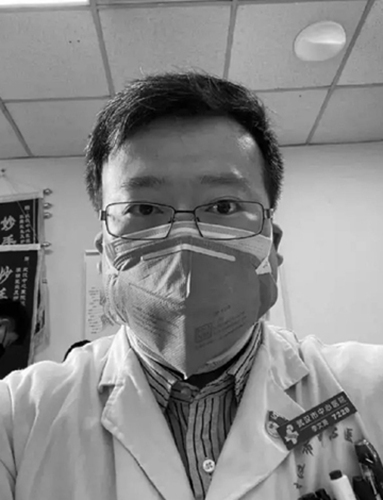HOME >> OPINION
Doctor’s death not an opportunity for the West to slam China
By Wang Wenwen Source:Global Times Published: 2020/2/9 21:36:37

Doctor Li Wenliang (Web photo)
He died an unlikely hero. The death early Friday of Li Wenliang, a 34-year-old ophthalmologist at Wuhan Central Hospital, caused by the infection of novel coronavirus, triggered a public outcry overnight. He was greatly mourned by the people because he was among the first group of people to warn of the upcoming virus outbreak but concerns went unheeded.
It is indeed regrettable that his warning was silenced and failed to motivate various authorities to take action, which has partially led to the ongoing nationwide fight against the deadly virus.
Wuhan authorities owe Li an apology, and officials in Wuhan and Hubei Province owe an apology to the people of Wuhan and the entire country. If the seriousness of the novel coronavirus had been realized and preventive measures had been taken earlier, perhaps the epidemic may not have caused such a national panic and the work and life of Chinese people wouldn't have been upended to such a degree. Regret is mixed in the public's mourning of Li.
For the past 20 days, all Chinese people have endured a lot of hardships as the country is engaged in fighting the virus. Although they understandably have complaints as bad things happen in times of crisis, they still have faith in their government, as always. This is a time when they need more information and greater transparency and truth in every update on the spread of the disease.
At the outset, when knowledge of the coronavirus was limited, it's understandable that authorities didn't want to create panic. That may be the reason why Li was reprimanded. This is how China has dealt with online rumors in recent years, which to some extent has proved effective.
But Li wasn't spreading rumors. He was expressing his professional judgment (although he is an ophthalmologist), which should cause Wuhan authorities to reflect upon themselves and deliver a sincere apology to him and the public. If they were to do so, at least people would be emotionally comforted.
In a reassuring move, the country's Central Commission for Discipline Inspection has sent investigators to Wuhan to look into "questions raised by the people" after Li's death. The authorities understand that they cannot let public emotions boil over.
The circumstances of Li's death are indeed very sad, causing the public to vent grief and anger over how Li was treated after he made the warning to friends on WeChat. When people shared Li's words that he said before his death - "A healthy society should not have just one voice" - perhaps it's time for wiser approaches in our social governance. In an era of internet, rumors need to be suppressed, not truth.
Nonetheless, Western media are quick to call Li "a martyr for free speech in China." Some liberal Chinese even hailed him as an anti-system symbol. Hong Kong protesters, who have taken to the street for more than half a year, sensationalized Li's story to spread negative publicity on the mainland in an attempt to continue their so-called democratic movement.
Such politicization is surely not the will of Li. He was a member of the Communist Party of China and he was willing to be a pioneer on the frontline fight against the coronavirus. When he warned of the virus, he was not opposing the system. Labeling Li a martyr is nothing more than a malicious attempt to overstate the unfortunate circumstances of his treatment and death.
While Li has received enormous attention from the Western media, the first doctor who reported the novel coronavirus to higher authorities before its outbreak in Wuhan is Zhang Jixian, who is seldom mentioned in Western reporting. Zhang, a respiratory physician in a Wuhan hospital, remained firm in reporting the infectious disease to the authorities, which received the attention it deserved and helped curb the spread of the virus.
Reflecting on past mistakes and defeating the epidemic is surely what Li would have wanted. Li will be respected and remembered by the Chinese public for his contribution to better governance of the country, but he should never be used as a tool by the West to slander China.
The author is a reporter with the Global Times. wangwenwen@globaltimes.com.cn
Posted in: VIEWPOINT